
Choosing the Right Non-Ferrous Metal for Your Industry Needs
In today’s fast-paced industrial landscape, selecting the right materials can be a game-changer for businesses. Among the most vital decisions is choosing the appropriate non-ferrous metal for various applications. Non-ferrous metals, characterized by their absence of iron and resistance to rust, are indispensable across a wide range of industries. From construction to automotive, aerospace, and electronics, these metals offer unique properties tailored to specific industry requirements.This guide provides a comprehensive overview of how to select the right non-ferrous metal for your needs, taking into consideration key factors like durability, corrosion resistance, conductivity, and overall performance.
1. Aluminum: Lightweight and Versatile
Aluminum is one of the most commonly used non-ferrous metals due to its lightweight, corrosion resistance, and excellent conductivity. It is frequently used in industries such as aerospace, automotive, construction, and electronics. Aerospace: Aluminum’s lightweight nature makes it an ideal choice for aircraft manufacturing, reducing weight while maintaining strength.Automotive: Its use in the automotive industry helps improve fuel efficiency by reducing the overall weight of vehicles.Construction: Aluminum is also a popular choice in building materials, where its resistance to corrosion is critical for long-lasting structures.Choosing Aluminum: If your industry values lightweight materials with good strength and corrosion resistance, aluminum should be your go-to option.
2. Copper: High Conductivity and Durability
Copper is widely known for its excellent electrical conductivity and thermal properties. It is commonly used in the electrical and electronics industries, but also plays a critical role in plumbing and HVAC systems due to its durability.Electrical & Electronics: Copper’s high conductivity makes it an essential material for wiring, circuitry, and other electrical components.HVAC Systems: Copper’s thermal properties make it a preferred material in heating, ventilation, and air conditioning systems.Plumbing: Copper’s corrosion resistance makes it a top choice for plumbing applications, ensuring longevity in water supply systems.Choosing Copper: Opt for copper if your industry requires materials with high conductivity, thermal stability, and durability.
3. Zinc: Corrosion Resistance and Malleability
Zinc is often used as a protective coating for other metals due to its ability to resist corrosion. Industries such as construction, automotive, and manufacturing frequently use zinc in galvanization processes to protect steel or iron.Construction & Manufacturing: Zinc is often applied to steel in galvanization to prevent rust in bridges, buildings, and other structures exposed to harsh environments.Automotive: Zinc coatings are used in vehicles to protect against corrosion, extending the lifespan of car parts.Choosing Zinc: If protection against corrosion is paramount for your industry, particularly in construction or automotive applications, zinc offers a reliable solution.
Efforts Towards Sustainable Practices
Global initiatives and regulations are increasingly focusing on sustainable practices in the non-ferrous metals industry. Recycling programs, waste reduction strategies, and the adoption of cleaner production technologies are being implemented to mitigate environmental footprints and ensure long-term sustainability.
4. Nickel: High-Temperature Resistance and Strength
Nickel is known for its high melting point, strength, and corrosion resistance, making it a preferred metal in industries that operate under extreme conditions such as aerospace, oil & gas, and chemical processing.Aerospace:Nickel is commonly used in turbine engines and other high-temperature applications.Oil & Gas: Nickel alloys are used in pipelines and processing equipment to withstand harsh chemicals and high temperatures.Chemical Processing: Nickel’s chemical stability makes it ideal for use in corrosive environments.Choosing Nickel: Nickel is the ideal choice if your industry requires metals that can withstand high temperatures and corrosive environments.
5. Titanium: Strength and Corrosion Resistance
Titanium is known for its high strength-to-weight ratio and corrosion resistance, making it an invaluable material for industries such as aerospace, medical, and marine.Aerospace: Titanium’s combination of strength and lightweight properties makes it ideal for aircraft structures.Medical: Titanium is often used in medical implants due to its biocompatibility and corrosion resistance.Marine: Titanium’s ability to resist corrosion in saltwater environments makes it a popular choice in marine engineering.Choosing Titanium: If your industry demands a metal with a high strength-to-weight ratio and excellent corrosion resistance, particularly in harsh environments, titanium is your best bet.
Conclusion
Choosing the right non-ferrous metal for your industry requires an understanding of the specific demands of your applications. Whether it’s aluminum for its lightweight properties, copper for conductivity, zinc for corrosion resistance, nickel for high-temperature strength, or titanium for its robust performance, each metal brings unique benefits.
By analyzing the specific needs of your industry, including factors like durability , corrosion resistance, and conductivity, you can make an informed choice that will optimize your operational efficiency and ensure the longevity of your products.
FAQs About Non-Ferrous Metals Market Trends
Non-ferrous metals are metals that do not contain iron and are valued for their lightweight, corrosion resistance, and electrical conductivity properties.
Industries such as automotive, construction, electronics, aerospace, and telecommunications rely on non-ferrous metals for various applications.
Mining and processing of non-ferrous metals can lead to environmental impacts such as habitat destruction, water pollution, and carbon emissions. Sustainable practices and technological innovations are being implemented to mitigate these challenges.
India is emerging as a significant player in the global non-ferrous metals market due to its expanding industrial base, infrastructure development, and increasing consumer demand for metal products.
The market is expected to grow steadily, driven by technological advancements, urbanization, and infrastructure investments. Innovations in material sciences and sustainable practices will shape the future of the non-ferrous metals industry.
